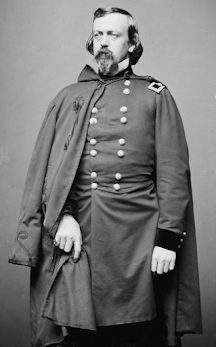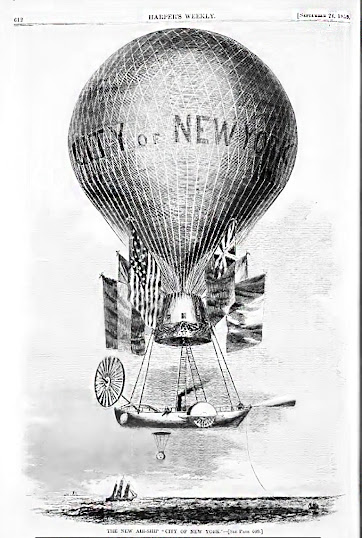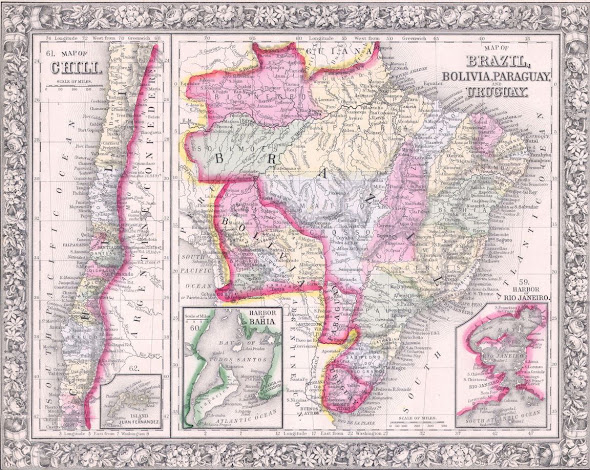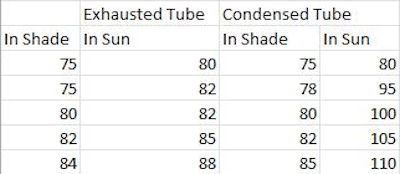Protecting Lincoln and Securing The District of Columbia
Charles P. Stone, Brigadier General,
USV
Inauguration Day Washington March 4,
1861
Protecting Lincoln
The Century magazine compiled a four volume history of the Civil War with
an emphasis on having participants of a particular campaign or incident write
about it. The series was lavishly
illustrated with new engravings as well as reprints of engravings the magazine
had published before. The first of the four thick volumes starts with an
account by Brig. Gen. Charles Pomeroy Stone, (September 30, 1824-Jan 24, 1887)
the officer charged with protecting Lincoln and Buchanan on inauguration day as
well as organizing the defense of the District of Columbia.
Charles Pomeroy Stone was an 1844 graduate of West Point. He
fought in several battles of the Mexican War and came out of the conflict
promoted to captain. Soon afterwards he
resigned his commission because a captain’s pay would not support his wife and
growing family. Moving to California, he eventually opened a bank which failed
when his partner absconded with the funds in 1859, including $20,000 invested
by his in-laws. In 1860 he was back on
the east coast living in Washington, D.C with his in-laws and looking for work.
Brig. Gen. Charles P. Stone
WASHINGTON ON THE EVE OF THE WAR
By Gen. Charles P. Stone, U.S.V. from
The Century Magazine
On the 31st of December 1860,
Lieutenant General Scott, General in Chief of the Army, who had his
headquarters in New York, was in Washington. The president, at last thoroughly
alarmed at the results of continued concessions to secession had summoned him
for consultation. On the evening of that day, I went to pay my respects to my
old commander and was received by him at Wormley Hotel. He chatted pleasantly
with me for a few minutes, recalling past service in the Mexican War and when
the occasion presented itself, I remarked I was glad to see him in good spirits
for that proved to me that he took a more cheerful view of the state of public
affairs that he had on his arrival, more cheerful than we in Washington had
dared to take during the past few days.
“What proportion of the population
would sustain the government by force if necessary?” he asked.
“It is my belief General,” I replied,
that 2/3 of the fighting stock of this population would sustain the government
in defending itself if called upon. But they are uncertain as to what can be
done or what the government desires to have done, and they have no rallying
point.”
The general walked the room again in silence.
The carriage came to the door, and I accompanied him toward it. As he was leaving, he turned suddenly, looked
me in the face, placed his hand on my shoulder and said, “These people have no
rallying point. Make yourself the rallying point!”
The next day I was commissioned by the
President, Colonel and Inspector General of the District of Columbia. I was
mustered into the service of the United States on the second day of January
1861as special requisition of the General in Chief. I was thus the first of two
and a half millions called into the military service of the Government to
defend it against secession.
On the 2nd of January, I met at the
entrance of the Metropolitan Hotel, Captain Schaefer of The National Rifles of
Washington and I spoke to him about his company, which was remarkable for its drill.
Schaefer had been a Lieutenant in the Third United States artillery and was an
excellent drillmaster. He had evidently not yet heard of my appointment as
Inspector General, and he replied to my complimentary marks on his company. “Yes,
it is a good company and I suppose I shall soon have to lead it to the banks of
the Susquehanna.”
“Why so?” I asked.
“Why to guard the frontier of Maryland and help keep the
Yankees from coming down to coerce the South!”
I said to him quietly,
that I thought it very imprudent of him, an employee of the Department of the
Interior and captain of a company of the District Columbia volunteers, to use
such expressions. He replied that most of his men were Marylander’s and would
have to defend Maryland. I told him that he would soon learn that he had been
imprudent and advised him to think more seriously of his position, but did not
inform him of my appointment, which he would be certain to learn the following
morning from the newspapers.
It must be admitted
this was not a very cheerful beginning.
…
Having thus studied the ground and taken
the first necessary steps towards security, I commenced the work of providing a
force of volunteers. I addressed individual letters to some 40 well known and
esteemed gentleman of the district, informing each one that it would be
agreeable to the government should he, in his neighborhood, raise and organize
a company of volunteers for the preservation of order in the district. To some
of these letters I received no replies. To some I received replies courteously
declining the service. To some, I received letters sarcastically declining, but
many I received enthusiastically accepted the service. In about six weeks, 33
companies of infantry and rifleman and two troops of cavalry were on the lists
of the District Volunteer Force, and all had been uniformed, equipped and put
under frequent drill.
The Liberty Fire companies brought
their quota, the Lafayette Hose Company was prompt to enroll; the masons, the
carpenters, the stone cutters, the painters and the German Turners responded.
Each corporation formed its companies and drilled industriously. Petty
rivalries disappeared, and each company strove to excel the others in drill and
discipline. While the newly organized companies thus strove to perfect
themselves, the older organizations resumed their drills and filled their ranks
with good recruits.
The National Rifles Co. (Captain
Schaefer) was carefully observed, and it was found that its ranks received
constant accessions, including the most openly declared secessionists, and even
members of Congress from the Southern states. This company was very frequently
drilled in its armory and its new recruits were drilled nearly every night.
Having as Inspector General a Secret Service force at my disposition, I placed
a detective in the company and had regular reports of the proceedings of its
captain. He was evidently pushing for an independent command of infantry,
artillery and cavalry, having his rifles, cannons, sabers and revolvers stored
in his armory. He also began to prepare for action, ordering his men to take
their rifles and equipment home with them with a supply of ammunition so that
even should his armory be occupied, they could assemble on short notice, ready
for action. Meantime, his commission as major was signed by the president and sent
to me. I reported these matters to General Scott, who ordered me to watch these
proceedings carefully and to be ready to suppress any attempt at violence but
to avoid, if possible, any shock for said he, “We are now in such a state that
a dogfight might cause the gutters of the capital to run with blood.” While the
volunteer force for the support of the government was organizing another force
with exactly opposite purpose was in course of formation. I learned that the
Great Hall over Beach’s Livery stable was nightly filled with men who were
actively drilled. Dr B---of well-known secessionist tendencies was the moving
spirit of these men and he was assisted by other citizens of high standing
among them (a man) who was a connection of Governor Letcher of Virginia. The
numbers of these occupants of Beach Hall increased rapidly and I found it well
to have a skilled New York Detective officer who had been placed at my
disposition enrolled among them. These men called themselves National
Volunteers and, in their meetings, openly discussed the seizure of the national
capital at the proper moment.
In February 1861 Colonel Stone had 33
new companies of militia organized.
Then, an order came from the Secretary of War no arms were to be issued
to new militia. Stone went to the Secretary of War, Holt, who told him
President Buchanan himself had sent the order.
Stone went to see Buchanan. The
local District Attorney, Robert Ould had advised him, Buchanan said, that it
would not be wise to allow these new militia companies arms because many of the
companies were raised from men in rival organizations such as different
firefighting companies and would surely fall to fighting if issued rifles and
ammo. Stone protested; he would resign if he was expected to train volunteer
units to defend the capital with no armaments. The militias themselves would
see the uselessness of it and dissolve, Stone insisted. Buchanan finally
agreed, telling Stone if there were any bloodshed, Stone would be to blame. There was never even a hint of that sort of
brawling among the militia companies, Stone recorded.
Colonel Stone
recounts there were numerous warnings sent to General Scott of various plots to
kill Lincoln and/or seize control of the government. Some of these were simply fantasies, while
others were taken very seriously, particularly one from the president of the
Baltimore Railroad on which Lincoln was to arrive in Washington. Dorothea Dix, then the famous advocate for
building mental health asylums, was in Virginia when she overheard men planning
to ambush Lincoln in Baltimore when he transferred from one train station to
the other. Baltimore was a hotbed of
secessionists. Since there was no
standard track gauge for railroads at the time, to reach Washington Lincoln
would have to cross town to reach the other train station. A plan was in place
to seize and murder Lincoln as he crossed town. The president elect’s itinerary
had been widely published, so the plotters knew when and where he would
be. Dix related the information to her
friend, president of the Baltimore railroad and he related the information to
Pinkerton. Asked years later why she
never claimed credit for detecting the plot, allowing Pinkerton to take credit
for it, she answered she would have destroyed her credibility in the South had
it become known she had saved Lincoln’s life.
The disloyal
militias in the District had to be disarmed.
When Dr. B----, Stone recounted, came to him to ask for more armaments,
Stone replied that Dr. B’s enlistment roll was not provably authentic, so no
arms would be issued.
Disarming the
National Rifles took a bit more tact. They had artillery as well as rifles and
plenty of ammunition and Captain Schaefers had already made his Southern
sympathies known. Captain Schaefer came to ask Stone for more rifles and
ammunition. When Stone refused, Schaefer said he would simply go there with his
men and take them. There were only 4 men on guard at the armory, Schaefer
declared. (In fact, there were only 2 Stone wrote). Stone told him, yes, but
Schaefer and his men would face 150 regulars when they came out. Companies of sappers and miners (what we call
combat engineers) had been sent from West Point but Schaefer did not know these
troops had not yet arrived.
…
The time
had evidently come to disarm Captain Schaefer, and when he reached his office
after leaving mine, he found there an order directing him to deposit in the
Colombian Armory before sunset on that day, the two howitzers with their
carriages which he had in his possession as well as the sabers and revolvers,
as these weapons formed no part of the proper armament of a company of rifleman.
He was taken by surprise and had not time to call together men enough to resist
so that nothing was left to him but to comply with the order. He obeyed it,
knowing that if he did not, I was prepared to take the guns from his Armory by
means of other troops.
He presented himself again in my
office, and before he had time to speak, I informed him that I had a Commission
of major in his name.
He was much pleased and said, “Yes, I
heard that I had been appointed.”
I then handed him a slip of paper on which I
had written out the form of oath, which the old law required to be taken by
officers. That law never having been repealed and said to him, “Here is the
form of oath you are to take. You will find a justice of the peace on the next
floor. Please qualify. Sign the form in in duplicate and bring both to me. One
will be filed with your letter of acceptance, the other will be filed in the
clerk's office of the Circuit Court of the District.”
He took the paper with a sober look and stood
near my table several minutes looking at the form of oath and turning the paper
over, while I apparently very busy with my papers, was observing him closely. I
then said, “Schaefer have you already taken the oath?”
“No,” said he.
“Well, please be quick about it, as I have no time to spare.”
He hesitated and said
slowly, “In ordinary times, I would not mind taking it, but in these times….”
“Ah!”, said I. “You declined to accept your Commission of
major. Very well.” And I returned his
Commission to the drawer and locked it in.
“Oh no,” said Schaefer. “I want the Commission.”
“But Sir, you cannot have it. Do you suppose that in these
times, which are not, as you say, ordinary times, I would think of delivering a
Commission, as field officer, to a man who hesitates about taking the oath of
office? Do you think that the government of the United States is stupid enough
to allow a man to march armed men about the federal district under its
authority? When that man hesitates to take the simple oath of office? No, Sir,
you cannot have that Commission and more than that, I now inform you that you
hold no office in the District of Columbia volunteers.”
“Yes, I do. I am captain and had my Commissioner as such signed by the President and delivered to
me by the Major General.”
“I am aware that such a paper was delivered to you, but you
failed legally to accept it.”
“I wrote a letter of acceptance to the adjutant general and forwarded
through the Major General.”
“Yes, I am aware that you did, but I know also that you failed
to enclose in that letter, according to law, the form of oath required to
accompany all letters of acceptance. On the register of the War Department,
while the issuance of your Commission is recorded, the acceptance is not
recorded. You have never legally accepted your Commission and it is now too
late. The oath of a man who hesitates to take it will not now be accepted.”
…
Leonard Swett, advance man for
Lincoln, arrived in Washington in February to talk with Stone and General Scott
about security and other proceedings and arrangements for the inauguration.
Stone accompanied Swett on his way to the train station to return to Lincoln…
Swett said, “Mr. Lincoln, and in
fact, everybody, is ignorant of the vast amount of careful work which has been
done to ensure the existence of this government and to render certain, the safe
inauguration of Mr. Lincoln. He will be grateful to you both.”
I replied with more sincerity than
tact: “Mr. Lincoln has no cause to be grateful to me. I was opposed to his
election and believed in advance that it would bring on what is evidently
coming, a fearful war. The work I have done has not been done for him and he
need feel no obligations to me. I have done my best toward saving the
government of this country and to ensure the regular inauguration of the
constitutionally elected president on the Fourth of next month.”
…
On the afternoon of the 3rd of March,
General Scott held a conference at his headquarters, there being present, his
staff, General Sumner and myself, and then was arranged the program of the
procession. President Buchanan was to drive to Willard Hotel and call upon the
president- elect. The two were to ride in the same carriage, between double
files of a squadron of the District of Columbia Cavalry. The company of Sappers
and Miners were to March in front of the presidential carriage, and the
infantry and rifleman of the District of Columbia were to follow it. Rifleman
in squads were to be placed on the roofs of certain commanding houses which I
had selected, along Pennsylvania Ave, with orders to watch the windows on the
opposite side and to fire upon them in case any attempt should be made to fire
from these windows on the presidential carriage. The small force of regular
cavalry, which had arrived was to guard the side street crossings of
Pennsylvania Ave, and to move from one to another during the passage of the
procession. A battalion of District of Columbia troops were to be placed near
the steps of the Capitol, and rifleman in the windows of the wings of the
capital. On the arrival of the presidential party at the Capitol, the troops
were to be stationed so as to return in the same order after the ceremony.
To illustrate the state, of
uncertainty in which we were at that time concerning men, I may here state that
the Lieutenant Colonel, Military secretary of the General in Chief, who that
afternoon recorded the conclusions of the General in conference, and who
afterward wrote out for me the instructions regarding the disposition of
troops, resigned his commission that very night, and deported for the South,
where he joined the Confederate Army.
During the night of the 3rd of March,
notice was brought to me that an attempt would be made to blow up the platform
on which the president would stand to take the oath of office. I immediately
placed men under the steps and at daybreak, a trusted battalion of district
troops formed in a semicircle at the foot of the great stairway and prevented
all entrance from without. When the crowd began to assemble in front of the
portico, a large number of policemen in plain clothes were scattered through
the mass to observe closely, to place themselves near any person who might act
suspiciously, and to strike down any hand which might raise a weapon.
At the appointed hour, Mr. Buchanan was
escorted to Willard Hotel, which he entered. There I found a number of mounted
marshals of the day, and posted them around the carriage, within the Cavalry
Guard. The two presidents were saluted by these troops as they came out of the
hotel and took their places in the carriage. The procession started. During the
march to the Capitol, I rode near the carriage, and by apparently clumsy use of
my spurs managed to keep the horses of the cavalry in an uneasy state, so that
it would be very difficult for even a good marksman to get an aim at one of the
inmates of the carriage between the prancing horses.
After the inaugural ceremony, the
President and ex-President were escorted in the same order to the White House.
Arrived there, Mr. Buchanan walked to the door with Mr. Lincoln, and there,
bade him welcome to the (White)House, and good morning. The infantry escort
formed in line from the gate of the White House to the house of Mr. Ould, whither
Mr. Buchanan drove, and the cavalry escorted his carriage. The infantry line
presented arms to the ex-president as he passed, and the cavalry escort saluted
as he left the carriage and entered the house. Mr. Buchanan turned on the steps
and gracefully acknowledged the salute. The District of Columbia volunteers had
given to President Lincoln his first military salute and to Mr. Buchanan his
last.
The District of Columbia volunteer militias would
remain under Stone’s command and serve, without pay until May and June of
1861 when they were entered into regular service.
Charles Stone’s service would not be acknowledged. In
fact, he would be the scapegoat for the defeat at the Battle of Ball’s Bluff
near Leesburg, Virginia October 21,1861.
Following the battle, he would be subjected to some of the most
humiliating actions and imprisonment (on charges never made public or even
revealed to Stone himself) to be suffered by a general officer on either side
of the Civil War.
Released in
1864 but given no assignment of any importance, his old friend General Sherman
wrote a glowing recommendation to the King of Egypt for Stone to take a
position as a pasha-general-in the Egyptian Army. Stone served there
over twelve years and returned to the Unites States where he was hired as the
engineer overseeing the construction of the Statue of Liberty’s base in
Bedloe’s Island in New York Harbor and then to oversee the reassembly and
construction of the statue itself.





Comments
Post a Comment